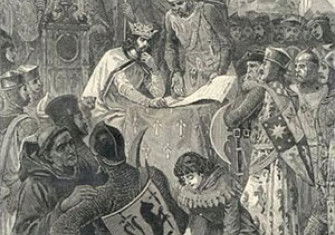Magna Carta: An Interactive Guide
Explaining some of the key clauses in the Great Charter.
This year marks the 800th anniversary of the sealing of Magna Carta and it has been much talked about, but what did it look like and what did it say?
In 1215, multiple copies of the document were produced and sent out around the country. Only four of these survive: two held by the British Library, one by Salisbury Cathedral and one by Lincoln.
The copy shown above is one of the British Library copies, Cotton MS Augustus ii.106. We have picked out some key features below, with their Latin transcription and English translations.
These include some of only three clauses from the original 1215 Magna Carta which have survived into modern law, Clauses 39-40, which ensure the right to due legal process for all citizens.
Other clauses of interest include Clauses 20-22, which regulate the imposing of fines, and Clause 35, which sets out standardised measures for wine, ale, corn and cloth across the whole kingdom.
Navigating the zoomable image above, you will also be able to see John’s name beginning the text (Iohannes, in Latin) with its large initial ‘I’, the rest of it abbreviated to ‘Iohs’; and, at the end of the main block of text, the clause marking the place and date of Magna Carta’s sealing: Runnymede (Ronimed) on June 15th.
For more on Magna Carta, pick up the July issue of History Today.
 Johannes Dei gratia rex Angliae, dominus Hiberniae, dux Normanniae, et comes Andegaviae, archiepiscopis, episcopis, abbatibus, comitibus, baronibus, justiciariis, forestariis, vicecomitibus, praepositis, ministris et omnibus ballivis et fidelibus suis salutem.
Johannes Dei gratia rex Angliae, dominus Hiberniae, dux Normanniae, et comes Andegaviae, archiepiscopis, episcopis, abbatibus, comitibus, baronibus, justiciariis, forestariis, vicecomitibus, praepositis, ministris et omnibus ballivis et fidelibus suis salutem.
'John, by the grace of God King of England, Lord of Ireland, Duke of Normandy and Aquitaine and Count of Anjou, to his archbishops, bishops, abbots, earls, barons, justices, foresters, sheriffs, reeves, officers and to all his bailiffs and faithful subjects, greetings.'
 Clause 9: Nec nos nec ballivi nostri seisiemus terram aliaquam nec redditum pro debito aliquo, quamdiu catalla debitoris sufficiunt ad debitum reddendum; nec pleggii ipsius debitoris distringantur quamdiu ipse capitalis debitor sufficit ad solutionem debiti; et si capitalis debitor defecerit in solutione debiti, non habens unde solvat, pleggii respondeant de debito; et, si voluerint, habeant terras et redditus debitoris donec sit eis satisfactum de debito quod ante pro eo solverint, nisi capitalis debitor monstraverit se esse quietum inde versus eosdem pleggios.
Clause 9: Nec nos nec ballivi nostri seisiemus terram aliaquam nec redditum pro debito aliquo, quamdiu catalla debitoris sufficiunt ad debitum reddendum; nec pleggii ipsius debitoris distringantur quamdiu ipse capitalis debitor sufficit ad solutionem debiti; et si capitalis debitor defecerit in solutione debiti, non habens unde solvat, pleggii respondeant de debito; et, si voluerint, habeant terras et redditus debitoris donec sit eis satisfactum de debito quod ante pro eo solverint, nisi capitalis debitor monstraverit se esse quietum inde versus eosdem pleggios.
'Neither we nor our bailiffs will seize any land or rent in payment for any debt, so long as the debtor’s chattels are sufficient to pay the debt; nor are the pledges of the debtor to be distrained so long as the principal debtor has enough to pay the debt. And if the principal debtor defaults on the debt, not having the means to pay it, the pledges are to answer for it. And if they wish, they may have the debtor’s lands and rents until they have had satisfaction for the debt they have settled for him, unless the principal debtor demonstrates that he is quit with regard to the pledges.'
 Clause 20: Liber homo non amercietur pro parvo delicto, nisi secundum modum delicti; et pro magno delicto amercietur secundum magnitudinem delicti, salvo contenemento suo; et mercator eodem modo, salva mercandisa sua; et villanus eodem modo amercietur salvo wainnagio suo; si inciderint in misericordiam nostram; et nulla praedictarum misericordiarum ponatur, nisi per sacramentum proborum hominum de visneto.
Clause 20: Liber homo non amercietur pro parvo delicto, nisi secundum modum delicti; et pro magno delicto amercietur secundum magnitudinem delicti, salvo contenemento suo; et mercator eodem modo, salva mercandisa sua; et villanus eodem modo amercietur salvo wainnagio suo; si inciderint in misericordiam nostram; et nulla praedictarum misericordiarum ponatur, nisi per sacramentum proborum hominum de visneto.
'A free man may not be fined for a small offence, except according to the nature of the offence; and for a great offence he shall be fined according to the magnitude of the offence, saving his livelihood; and a merchant in the same way, saving his merchandise; and a villein shall be fined in the same way, saving his growing crops, if they fall into our mercy. And none of the said fines may be made, except upon the oaths of honest men of the neighbourhood.'
Clause 21: Comites et barones non amercientur nisi per pares suos, et non nisi secundum modum delicti.
'Earls and barons are not to be fined except by their peers, and only in accordance with the nature of the offence'.
Clause 22: Nullus clericus amercietur de laico tenemento suo, nisi secundum modum aliorum praedictorum, et non secundum quantitatem beneficii sui ecclesiastici.
'No clergyman is to be fined on his lay tenement, except in accordance with the nature of his offence, in the way of others mentioned in previously, and not in accordance with the size of his ecclesiastical benefice'.
 Clause 35: Una mensura vini sit per totum regnum nostrum, et una mensura cervisie, et una mensura bladi, scilicet quarterium Londoniense, et una latitudo pannorum tinctorum et russetorum et halbergettorum, scilicet duae ulnae infra listas; de ponderibus autem sit ut de mensuris.
Clause 35: Una mensura vini sit per totum regnum nostrum, et una mensura cervisie, et una mensura bladi, scilicet quarterium Londoniense, et una latitudo pannorum tinctorum et russetorum et halbergettorum, scilicet duae ulnae infra listas; de ponderibus autem sit ut de mensuris.
'There shall be one measure of wine in the whole of our realm, and one measure of ale, and one measure of corn, namely, the quarter of London, and one width pf dyed, russet and haberget cloths, namely two ells within the borders. Let it be the same for weights as it is for measures'.
 Clause 39: Nullus liber homo capiatur, vel imprisonetur, aut dissaisiatur, aut utlagetur, aut exuletur, aut aliquo modo destruatur, nec super eum ibimus, nec super eum mittemus, nisi per legale judicium parium suorum vel per legem terrae.
Clause 39: Nullus liber homo capiatur, vel imprisonetur, aut dissaisiatur, aut utlagetur, aut exuletur, aut aliquo modo destruatur, nec super eum ibimus, nec super eum mittemus, nisi per legale judicium parium suorum vel per legem terrae.
'No free man is to be arrested, or imprisoned, or disseized, or outlawed, or exiled, or in any other way ruined, nor will we go or send against him, except by the legal judgment of his peers or by the law of the land'.
Clause 40: Nulli vendemus, nulli negabimus aut differemus, rectum aut justiciam.
'To no one will we sell, to no one will we deny or delay, right or justice'.






